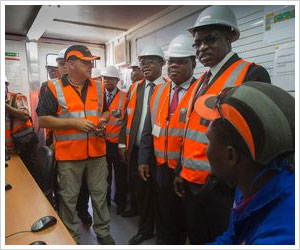 AGGREKO, a London-listed provider of temporary power generation, along with South African project partner the Shanduka Group and the Southern African Power Pool (Sapp), has expanded output at its gas-fired power plant at Ressano Garcia, on the Mozambique-South Africa border, to 232MW.
AGGREKO, a London-listed provider of temporary power generation, along with South African project partner the Shanduka Group and the Southern African Power Pool (Sapp), has expanded output at its gas-fired power plant at Ressano Garcia, on the Mozambique-South Africa border, to 232MW.
In March, the firm signed agreements with Mozambique national power utility Electricidade de Moçambique (EDM) and Namibia’s utility NamPower to supply an extra 122MW from the site. This helps alleviate a "critical shortage of energy" in the Southern African Development Community (Sadc).
The region wants to lift energy output by 70% in the next 15 years, investing $170bn in power projects. Ressano Garcia is the world’s first interim cross-border independent power producer project.
Aggreko sees significant growth in Sapp, which comprises nine countries. But the key to such growth is "to find and monetise gas", says Aggreko’s regional MD for Europe, the Middle East and Africa, David Taylor-Smith. Mozambican Energy Minister Salvador Namburete inaugurated the second phase of the plant last week.
The overall project design includes access roads, a 1.2km high-pressure gas pipeline, gas processing and depressurising equipment, a power substation, and about 2km of 275kV transmission line.
The modular addition of capacity took three months to complete. Power generated in Mozambique is now supplied to three national utilities, including Eskom. The first 110MW phase started generating in August last year, having taken about five months to install.
Eskom draws off 92MW of this power, while EDM takes 18MW of peaking power capacity. The second phase sees NamPower take 90MW, with 32MW reserved for EDM. "This unique project will contribute to the provision of a reliable power supply across Namibia and support the continued development of the country," NamPower MD Paulinus Shilamba says.
Mr Taylor-Smith says the cost of electricity from interim power plants can be within 20% of a national utility’s pricing.
But this depends on the technology used, the fuel consumed and the duration of the contract. "And obviously the cost of not having power is more expensive than having an interim solution," he says.
Aggreko has invested R105m from its own balance sheet into the "modular, scalable and portable" Ressano Garcia plant. It is expected to derive income of about $250m over two years, over and above fuel costs.
Aggreko will then remove its leased power-generating equipment and hand the property, including the substation, to Mozambican authorities.
But the timing is not certain, and depends on the status of new power projects in Mozambique.
EDM will transmit the extra power from Ressano Garcia to the South African border, where Eskom will "wheel it" across the domestic grid to Namibia.
The Mozambican plant was built following discussions initiated by Aggreko in early 2011. The group has about 8,000MW of rental power capacity globally, or about 20% of Eskom’s total generating capacity. About 1,000MW of this is in Africa. Ressano Garcia already had existing gas off-take agreements, and approved concessions and licences, making completion of the overall project that much faster.
"Following the first project … the second phase … will assist EDM and its partners in the Sapp to bridge the period until we implement our permanent plants in Mozambique," EDM CEO Augusto de Sousa Fernando says. Dignitaries attending the launch of the upgraded plant emphasise that Sadc members "significantly lack" electricity to grow both domestic and regional economies.
Aggreko provides power solutions for short or indeterminate lengths of time — to cities suffering power shortages, industrial sites, and major sporting events. The company supplied power to SA’s 2010 Soccer World Cup, the Vancouver 2010 Olympic Winter Games and the 2012 London Olympics and Paralympics. In April, Ressano Garcia scooped Africa’s Best Fast Track Power Project in 2012 title at the Africa Energy Awards in Johannesburg.
Natural gas for the plant is supplied by the Matola Gas Company through its gas infrastructure at Ressano Garcia. The company owns and operates natural gas transmission and distribution pipelines in Mozambique.
South African synfuels producer Sasol is a major party in processing and exporting natural gas from the country’s Pande and Temane fields.
Along with mining giant BHP Billiton’s Mozal aluminium smelter near Maputo, such projects are catalysts for socioeconomic development in the country, including new power production. But BHP says the Mozal smelter is not taking electricity from Aggreko’s plant. It also says the new capacity is "not significant enough" to prevent load-shedding at its Hillside and Bayside aluminium smelters at Richards Bay in neighbouring KwaZulu-Natal. It also has "no effect" on pricing agreements with Eskom, and Mozambican transmission entity Motraco in respect of Mozal.
Motraco is made up of the national electricity companies of South Africa, Mozambique and Swaziland. It was formed in the late 1990s as a model for Sadc regional co-operation and integration.
At the time, Eskom did not have a licence to sell electricity in Mozambique and EDM did not have sufficient transmission capacity to supply the smelter.
In 2008, when South Africa experienced rolling outages, Eskom told its main industrial customers to cut their use of power by 10%, including for the Bayside, Hillside and Mozal smelters.
BHP says it will go to court to protect the special payment contract it has with Eskom, which guarantees cut-rate electricity for its aluminium smelters to 2028. Eskom’s revelation that the deal will cost it R11.5bn in liabilities over the contract term has sparked an outcry in South Africa, where energy costs keep rising.